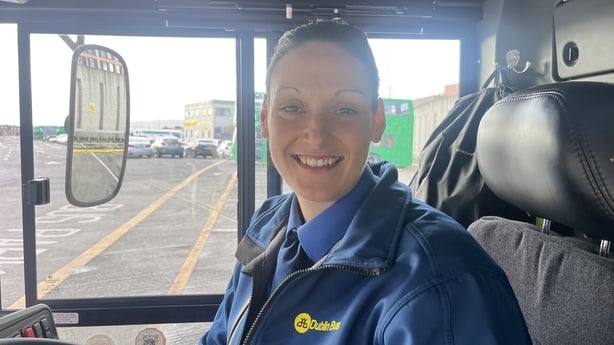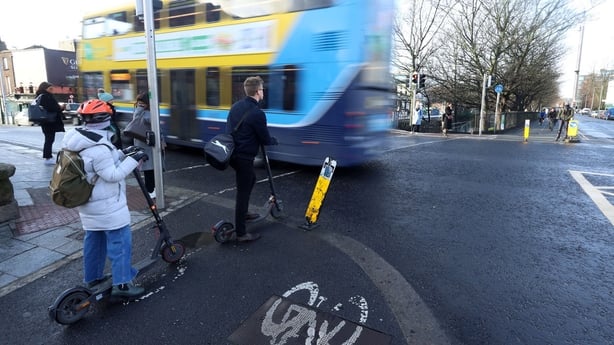Security guards have begun operating on Dublin Bus services in response to rising incidents of anti-social behaviour, which Dublin Bus says have doubled over the past five years.
Mobile teams of security personnel will travel on buses daily during afternoon, evening and night services as part of a 20-week pilot programme.
In 2019, there were around 500 reports of anti-social behaviour on Dublin Bus, but last year the figure had risen to over 1,000.
Two mobile units of security personnel will operate on the north and southside of the city between 2pm and 2am Sunday to Thursday and from 4pm to 4am on Friday and Saturday as part of the pilot programme that Dublin Bus plans to make permanent.
The company said its safer journeys team was established following advice from independent security experts and is designed to make customers and employees feel safer on their services.
They said the teams will be located in areas identified as priorities and that they will closely monitor their impact including feedback from customers and employees, incident response times and overall incident numbers.
'Every driver has the right to be safe' - unions
Dublin Bus said the security guards will complement existing safety measures such as on-board CCTV and close cooperation with the gardaí.
CEO of Dublin Bus Billy Hann said: "The team will provide a visible and reassuring presence for both our customers and employees, actively enhancing safety and security across our network."
Speaking to RTÉ's Morning Ireland, Mr Hann outlined that the security team will have a background role but will be identifiable to the public.
"It'll be very much a de-escalation type of role. So, if there's any issues with regards to anti-social behaviour, their first role will be to de-escalate that situation.
"But they'd be standing in the background, being visible, not getting involved in the operation at all, until it's absolutely necessary," Mr Hann said.
We need your consent to load this rte-player contentWe use rte-player to manage extra content that can set cookies on your device and collect data about your activity. Please review their details and accept them to load the content.Manage Preferences
Mr Hann said also that while he shared the view of the bus unions that a Garda Public Transport Unit is needed he said he could not wait for one to be introduced.
He also said the patrols will be focused on known trouble spots in the city
"They'll be jumping on and off buses all over the city and trying to and deal with any anti-social behaviour issues. One of their other functions is they'll be helping our revenue protection unit with regards to fare evasion and they'll also be helping with crowd control on our nighttime services, particularly in the city centre on Friday and Saturday evening. Statistically speaking we know the areas that have the challenges and we'll be focusing our personel in those areas"
He said he believes the 20-week pilot will be a success and that Dublin Bus will seek to make it a permanent measure but that they will require funding from the National Transport Authority to do so.

Bus driver Rachel Finlay who is based in Harristown Bus Garage in north Dublin said the introduction of security is a welcome measure for drivers who have been at the front line of the rise in anti-social behaviour on buses
"It's more verbal abuse, it can be racial abuse, it can be hitting the assault screen, sometimes due to the bus being late you can be called all names under the sun and some of the drivers have been spat at. You might have people who come on who are a bit intoxicated and more rowdy."
She said such incidents lead to the bus being pulled in, the control room being called and sometimes gardai attending the scene which can delay services and passenger journeys on some occasions for a number of hours.
"I'm absolutely delighted. It's a long, long time coming. I think it will support both customs and drivers. As a driver I'll be able to focus more on the road. Customers using our bus services will be more relaxed and feel safer on board"
No consequences for bad behaviour.
SIPTU and the National Bus and Rail Union (NBRU) have welcomed the move but said the need for a dedicated garda public transport unit remains.
General Secretary of the NBRU Dermot O'Leary said that the visibility of having security operating on Dublin Bus services was a positive thing, but it would not stop anti-social behaviour happening.
He said it might deter certain levels of anti-social behaviour, but security guards will not have powers of detention or arrest, and all they can do is remove someone from a bus, so essentially there are no consequences to bad behaviour.
He said that any time anti-social behaviour on Dublin Bus is highlighted was a good thing for union members, as they are witnessing this on almost a daily basis.
"It's a positive step but it's not the silver bullet, and not something that will deter people from engaging in anti-social behaviour".
He gave an example of DART and Commuter trains in Dublin that have had security for a while and for the four months up to August, there were 400 incidents across the network even with those people there.
He said that having security was working to a certain extent, also giving an example of the Luas which has security, and he said that again having visibility is positive and deters certain levels of anti-social behaviour but a police resource is needed ultimately.
He said that he would appeal to politicians that there needs to be a police resource on public transport, and needs to be legislated for.
SIPTU Transport Sector Organiser John Murphy said: "Every driver has the right to be safe and protected while at work and this initiative is a welcome move towards achieving that goal.
"However, we want to be very clear in our view, that this is not a silver bullet and the need for a dedicated garda public transport unit remains."
E-scooters banned from public transport from today
Iarnród Éireann's communications manager has said the banning e-scooters on public transport is a safety measure taken because of concerns the batteries might catch fire.
Based on guidance issued by the NTA earlier this year, public transport operators will prohibit the carriage of e-scooters on buses and trains, including those that can be folded or carried.
The restriction does not apply to e-bikes or mobility scooters.
Barry Kenny said no incidents have occurred on Irish public transport but there is a concern that it could happen, as it has happened in other countries.

Speaking on RTÉ's Morning Ireland, he added that the NTA will keep the issue under review.
Mr Kenny said a €100 fine would be given to people who take e-scooters on board. However, there has been huge compliance today, he said.
In advance of today, teams have been very active in advising people about the new measures, he said, and we have had signs up in the stations.
Safe e-scooter parking
Green Party Dublin City councillor Janet Horner said that anything that relates to fire safety had to be taken incredibly seriously.
She said she understood the motivation for the ban, but that many people had concerns as they may have taken an e-scooter on a train to save time on their journey, so the ban inconveniences people.
She said there needs to be safe parking for e-scooters, as this has largely been neglected.
Councillor Horner added that there was a need to incorporate e-scooters are part of Ireland's standard transport offering and parking has to be part of making them a sensible easy option, as other countries in the EU have done. as well as in the UK.
Also speaking about the ban, Dermot O’Leary, General Secretary of the National Bus and Rail Union said that transport operators had to err on the side of caution.
He said that people using e-scooters needed to wear high visibility clothing, and that there were other issues around them that needed to be debated too.
"There is still a problem with e-scooters at night time over visibility".






